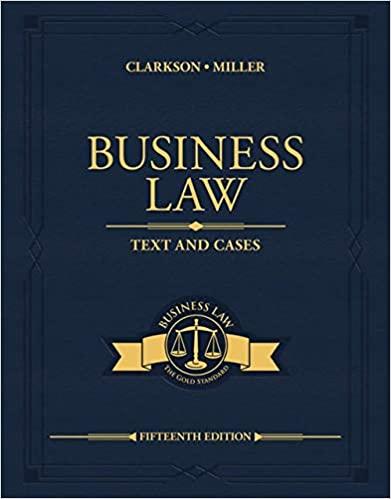Question
Question 1 : What is the source of the President's power to pardon? a) Article III, Section 2 of the United States Constitution. b) Article
Question 1: What is the source of the President's power to pardon?
a) Article III, Section 2 of the United States Constitution.
b) Article II, Section 2 of the United States Constitution.
c) Article I, Section 2 of the United States Constitution.
d) Federal statutes.
Question 2: Which of the following can limit the President's power to pardon?
a) The Constitution.
b) Federal statutes.
c) Federal regulations.
d) All of the above.
Question 3: Dan is convicted of multiple crimes. The President pardons Dan from one of those crimes, which has the effect of reducing Dan's prison sentence to time served and Dan is freed from prison. The pardon is:
a) Unconstitutional because the Constitution does not permit partial pardons.
b) Unconstitutional because the Constitution does not permit pardons to only reduce prison sentences.
c) Unconstitutional because Dan was convicted of multiple crimes.
d) Constitutional
Question 4: Dan is convicted of multiple crimes. The President pardons Dan from one of those crimes, which has the effect of reducing Dan's prison sentence to time served and Dan is freed from prison. The pardon also includes a monetary award to Dan and his family to compensate for the time served in prison. The pardon is:
a) Unconstitutional because the Constitution does not permit partial pardons.
b) Unconstitutional as to the payment of money because the Constitution does not permit pardons to include the payment of money.
c) Unconstitutional because Dan was convicted of multiple crimes.
d) Constitutional.
Question 5: Dan is convicted of multiple crimes. The President pardons Dan from one of those crimes, which has the effect of reducing Dan's prison sentence to time served and Dan is freed from prison. The pardon also includes an order shielding Dan from civil liability for any civil claims related to the crimes he was convicted of. The pardon is:
a) Unconstitutional because the Constitution does not permit partial pardons.
b) Unconstitutional as to the order regarding civil liability because the Constitution does not permit pardons regarding civil claims.
c) Unconstitutional because Dan was convicted of multiple crimes.
d) Constitutional
Question 6: In United States v. Nixon, the United States Supreme Court ruled that:
a) The matter was a nonjusticiable political question.
b) Separation of powers prevented the Court from ruling on the President's claim of executive privilege.
c) Executive privilege is absolute.
d) None of the above
Question 7: In United States v. Nixon, the United States Supreme Court ruled that:
a) Executive privilege is absolute.
b) Executive privilege is qualified and can be overcome by a sufficient showing of need for the information.
c) The tapes that were subject to subpoena were protected by executive privilege.
d) None of the above.
Question 8: Paul sues a toy manufacturer for selling a toy in the United States that was manufactured in China with hazardous materials. Paul's attorney discovers that the President had private discussions with the Chairman of the Consumer Product Safety Commission about banning toy from being sold in the United States, but decided not to do so out of concern that it would harm diplomatic relations with China. The attorney believes that the discussions would help establish the known dangers of the toy, so she subpoenas the Chairman to testify in the case. The President asserts executive privilege and the United States Attorney moves to quash the subpoena and prevent the Chairman from testifying. The Court should
a) Deny the motion and allow the testimony because the President cannot assert executive privilege for conversations, just recordings of those conversations.
b) Deny the motion and allow the testimony because it involves diplomatic information.
c) Grant the motion unless the plaintiff can establish that the need for the information outweighs the presumption that the information is privileged.
d) Grant the motion because executive privilege is absolute.
Step by Step Solution
There are 3 Steps involved in it
Step: 1

Get Instant Access to Expert-Tailored Solutions
See step-by-step solutions with expert insights and AI powered tools for academic success
Step: 2

Step: 3

Ace Your Homework with AI
Get the answers you need in no time with our AI-driven, step-by-step assistance
Get Started


